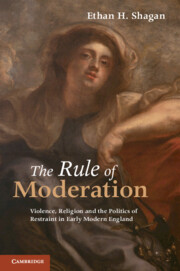Book contents
- Frontmatter
- Contents
- Figures
- Acknowledgements
- Abbreviations
- Prologue
- Part I Moderate foundations
- Part II Moderate churches
- Part III Moderate rule
- 5 English expansion and the empire of moderation
- 6 Social moderation and the governance of the middle sort
- 7 Moderate freedom in the English Revolution
- 8 How toleration became moderate in seventeenth-century England
- Conclusion
- Bibliography
- Index
- References
7 - Moderate freedom in the English Revolution
from Part III - Moderate rule
Published online by Cambridge University Press: 05 June 2012
- Frontmatter
- Contents
- Figures
- Acknowledgements
- Abbreviations
- Prologue
- Part I Moderate foundations
- Part II Moderate churches
- Part III Moderate rule
- 5 English expansion and the empire of moderation
- 6 Social moderation and the governance of the middle sort
- 7 Moderate freedom in the English Revolution
- 8 How toleration became moderate in seventeenth-century England
- Conclusion
- Bibliography
- Index
- References
Summary
Introduction: ‘the mean of liberty’
In modern political thought, we like to imagine ‘liberty’ as a simple antonym of ‘tyranny’, yet a moment's reflection reveals that this dualism is illusory. When we use the word ‘liberty’ in a political context, we implicitly assume a series of appropriate limitations; even the strictest libertarians admit that some forms of coercion and some limits to self-determination are not incompatible with liberty but essential to it. Political liberty, then, is ordinarily presumed to exist on a continuum, and its limitations are as significant as its core in defining what liberty means in particular political contexts. In the seventeenth century, when political ideals were routinely imagined as middle ways between extremes, this idea of limited liberty as true liberty was inevitably expressed in terms of moderation.
The interconnection between liberty and moderation can be found anywhere in early modern England that the idea of liberty came into vogue. But there is no better laboratory for studying this association, and no place where its ideological implications were more significant, than in the great, extended controversy over the nature of liberty we call the English Revolution. So, for instance, as Quentin Skinner has recently noted, Thomas Hobbes described himself in the dedicatory epistle to his Leviathan as responding to ‘those that contend, on one side for too great liberty, and on the other side for too much authority’. Far from being a novel claim for moderation in 1651, this was a commonplace. The parliamentarian theorist Henry Parker, for instance, wrote in 1642, ‘Long it was ere the world could extricate itself out of all these extremities…to avoid the danger of unbounded prerogative on this hand, and too excessive liberty on the other.’ In a tract significantly entitled The Arraignment of Licentious Liberty and Oppressing Tyranny (1647), the erstwhile parliamentarian and future royalist Nathaniel Hardy hoped that ‘neither royal majesty may invade the subjects’ liberty, nor the subjects’ liberty entrench too far on royal majesty’. In 1649, John Lilburne and his fellow Levellers admitted, ‘Though tyranny is so excessively bad, yet of the two extremes, confusion is the worst.’ The republican Marchamont Nedham in 1650 described the English Commonwealth as ‘the only bank which preserves us from the inundation of tyranny on the one side, and confusion on the other’. In 1656, the lawyer Michael Hawke argued that as a conjunction of ‘liberty and principality’ the Cromwellian protectorate was a ‘mean between an abrupt service under the dominion of a tyrant, and dissolute licentiousness…To the best princes the mean of liberty is most pleasing, and so to rule their subjects by reason and law, that they do live civilly without injury and enjoy quietly their properties and liberty.’ The examples are nearly limitless.
- Type
- Chapter
- Information
- The Rule of ModerationViolence, Religion and the Politics of Restraint in Early Modern England, pp. 254 - 287Publisher: Cambridge University PressPrint publication year: 2011

